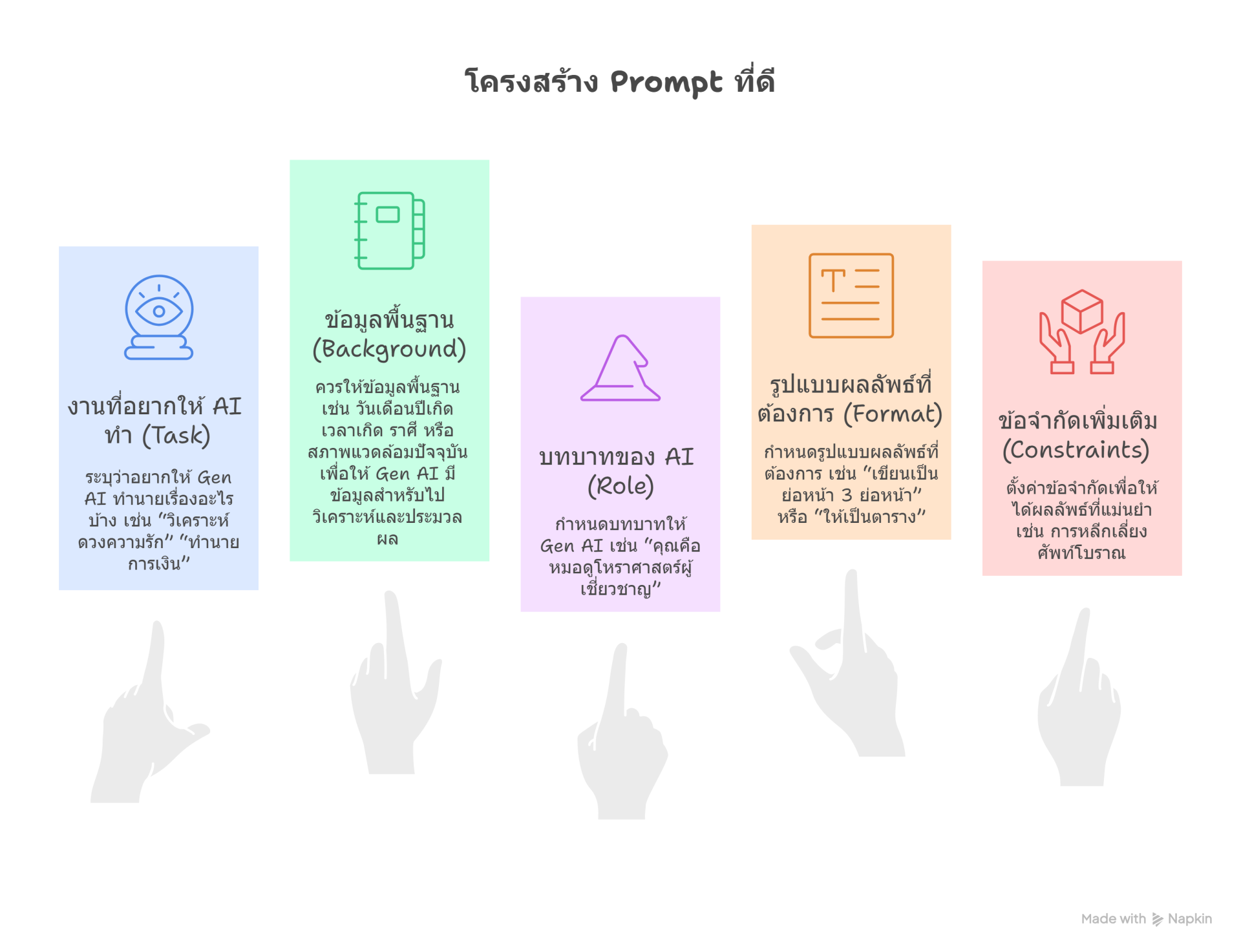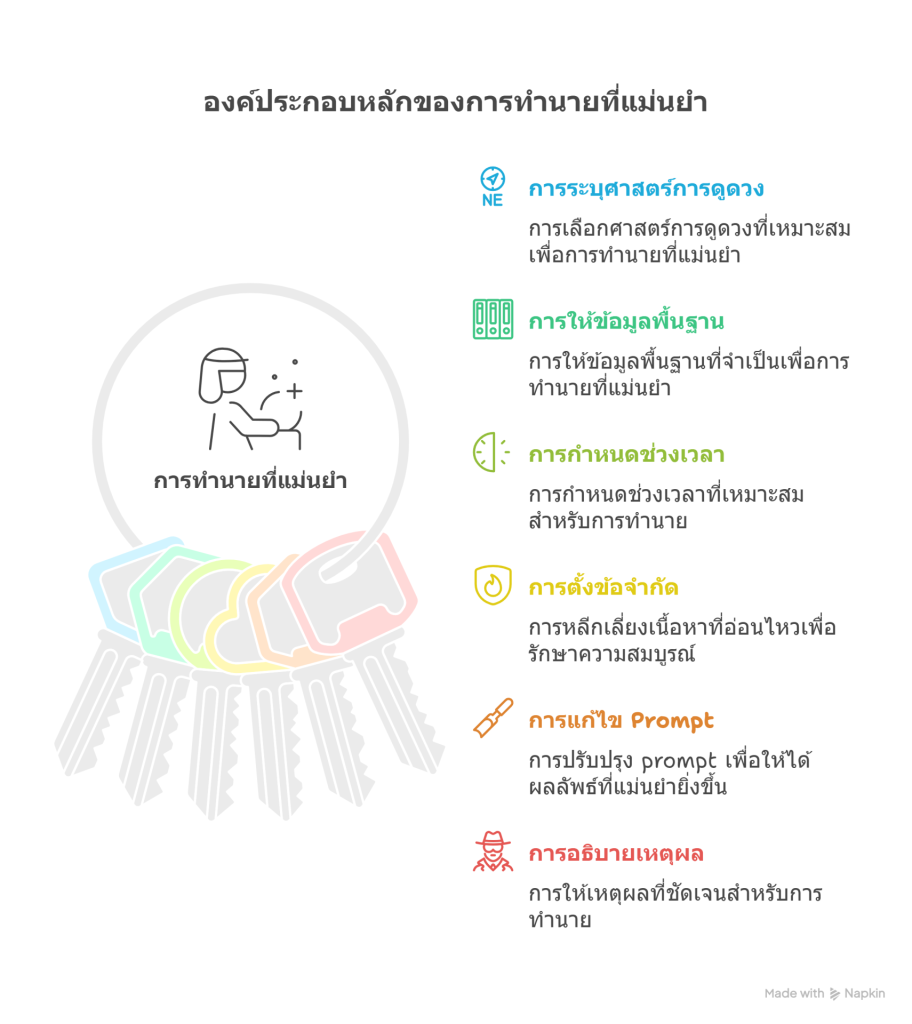ในยุคที่เทคโนโลยี AI ก้าวหน้าอย่างรวดเร็ว หลายคนเริ่มนำ AI มาใช้ในหลากหลายด้าน จากบทความที่แล้ว “AI ทำนายทายทัก: การประยุกต์ใช้ Big Data และปัญญาประดิษฐ์ (AI) ในการพยากรณ์อนาคต” หนึ่งในนั้นคือ “การดูดวง” มาบทความนี้ เราจะมาเรียนรู้ข้อแนะนำเบื้องต้นในการเขียนคำสั่ง (prompt) ให้ Generative AI หรือที่เราเรียกกันย่อ ๆ ว่า Gen AI ช่วยวิเคราะห์จากข้อมูลพื้นฐาน พร้อมข้อควรระวัง ในการใช้ prompt สำหรับงานดูดวงด้วย AI โดยอ้างอิงแหล่งต่าง ๆ ที่น่าเชื่อถือ เพื่อให้คุณสามารถเริ่มต้นใช้งานได้อย่างมั่นใจ เพราะหาก prompt คลุมเครือหรือไม่มีโครงสร้างชัดเจน ผลลัพธ์ที่ได้อาจไม่ถูกใจหรือไม่สมเหตุสมผล
ก่อนอื่นขออธิบายความหมายของ Prompt ก่อน Prompt คือ คำสั่งหรือข้อความที่ผู้ใช้ป้อนเข้าไปให้ Gen AI เพื่อให้ AI สร้างผลลัพธ์ตามที่เราต้องการ Prompt ที่ดีจะช่วยให้ AI ตีความความต้องการของเราได้แม่นยำและตรงจุดมากขึ้น โดยทั่วไปแล้ว โครงสร้าง Prompt ที่ดีมักประกอบด้วยองค์ประกอบต่าง ๆ ดังนี้

การใส่องค์ประกอบเหล่านี้ช่วยลดความกำกวมของ prompt และช่วยให้ผลลัพธ์ใกล้เคียงกับสิ่งที่เราต้องการมากที่สุด นอกจากนี้ยังมีเทคนิคอื่น ๆ ที่ช่วยให้ผลลัพธ์ดีขึ้น ดังนี้
1. การระบุศาสตร์การดูดวง โลกของการดูดวงมีหลายศาสตร์ เช่น ไพ่ทาโรต์ โหราศาสตร์ไทย โหราศาสตรจีน ถ้า prompt ระบุล่วงหน้าว่า “ใช้โหราศาสตร์ไทย” หรือ “วิเคราะห์โดยใช้ไพ่ยิปซี” จะช่วยให้ AI เลือกวิธีการวิเคราะห์ที่ตรงกับความต้องการของเราได้ดีกว่า
2. การให้ข้อมูลพื้นฐานที่เพียงพอ AI ต้องการข้อมูลเข้า (input) ที่เพียงพอ เช่น วันเดือนปีเกิด เวลาเกิด สถานที่เกิด หรือข้อมูลเสริม เช่น ช่วงเวลาที่สำคัญในชีวิต ถ้าป้อนข้อมูลไม่ครบ หรือคลุมเครือ AI อาจเดาและให้คำตอบผิดพลาด
3. การกำหนดช่วงเวลาทำนาย ระบุว่าอยากทำนายเป็น รายวัน รายเดือน รายปี หรือ 5 ปีข้างหน้า เช่น “ช่วยให้วิเคราะห์ดวงประจำปี 2025”
4. การตั้งข้อจำกัดหรือหลีกเลี่ยงเนื้อหาที่อ่อนไหว เช่น “ไม่ทำนายเรื่องการเมือง” หรือ “ไม่แนะนำการรักษาทางการแพทย์” เพื่อหลีกเลี่ยงการให้คำแนะนำที่ควรได้รับจากผู้เชี่ยวชาญ
5. การแก้ไข prompt (Prompt Iteration) เมื่อ AI ตอบมาแล้ว ถ้าผลลัพธ์ยังไม่ตรงใจ ให้ Prompt ปรับคำสั่งเพิ่มเติม เช่น “ให้เจาะลึกเพิ่มในเรื่องการเงิน” หรือ “ลดการใช้ภาษาพูดแบบอุปมา” นี่คือแนวคิดการแก้ไข prompt ที่มักพูดถึงในคู่มือ Prompting Frameworks
6. การ prompt ให้ Gen AI อธิบายเหตุผล ประกอบคำทำนาย เช่น “นอกจากทำนายแล้ว ช่วยอธิบายที่มาที่ไปของคำทำนายนั้น ๆ ด้วย” จะเพิ่มความโปร่งใส และช่วยให้ผู้ใช้เข้าใจ logic ที่ AI ใช้

ต่อไป จะเป็นตัวอย่าง Prompt สำหรับดูดวง ที่สามารถนำไปใช้หรือปรับแต่งกับ Gen AI เช่น ChatGPT เป็นต้น ซึ่งผู้อ่านสามารถปรับแต่งให้สั้น ยาว หรือเพิ่มเงื่อนไขย่อยได้ตามต้องการ
ตัวอย่าง 1 “คุณคือหมอดูโหราศาสตร์ไทยผู้เชี่ยวชาญ ช่วยวิเคราะห์ดวงชะตาของฉันตามวันที่เกิด 15 สิงหาคม 2530 เวลาเกิด 13:45 และสถานที่เกิด กรุงเทพฯ ในปี 2025 โดยแยกคำทำนายสำหรับเรื่องการงาน การเงิน ความรัก สุขภาพ พร้อมคำแนะนำที่เป็นไปได้ได้ 3 ข้อ และอธิบายที่มาของคำทำนายด้วย”
ตัวอย่าง 2 “ใช้ศาสตร์ไพ่ยิปซี ทำนายดวงรายเดือนของฉันสำหรับเดือนหน้า (เดือนมกราคม ปี 2026) โดยให้ผลลัพธ์เป็น 3 เรื่องใหญ่ที่ควรระวัง พร้อมแนวทางแก้ไข และเหตุผลประกอบคำตอบ”
ตัวอย่าง 3 “คุณคือโหราจารย์จีน ช่วยวิเคราะห์ดวงชะตาตามปีนักษัตร ฉันเกิดปีมะเส็ง 2532 ช่วงชีวิตปีหน้า (2569) ให้คำทำนายในเรื่องการงาน-โชคลาภ-สุขภาพ พร้อมเลขมงคลและสีมงคลที่ควรใช้”
โดยสรุปข้อแนะนำเบื้องต้นการเขียน Prompt สำหรับการดูดวงด้วย Gen AI คือ ควร prompt ตามโครงสร้าง prompt ที่ดี ได้แก่ งานที่อยากให้ AI ทำ (Task) ข้อมูลพื้นฐาน (Background) บทบาทของ AI (Role) รูปแบบผลลัพธ์ที่ต้องการ (Format) และข้อจำกัดเพิ่มเติม (Constraints) เพื่อช่วยให้ผลลัพธ์ใกล้เคียงกับที่เราคาดหวัง นอกจากนี้การแก้ไข prompt (Prompt Iteration) หลังจากได้รับผลลัพธ์แล้วเป็นสิ่งสำคัญ เพิ่มให้ได้คำทำนายตรงความต้องการมากยิ่งขึ้น สุดท้ายนี้ การดูดวง ไม่ว่าจะเป็นดูกับหมอดูหรือกับ Gen AI เราควรมีวิจารณญาณ ไม่ยึดคำทำนายเป็นความจริง และไม่ใช้ AI แทนคำปรึกษาวิชาชีพ
แหล่งอ้างอิง
Data Innovation Educator
- Tharaphon Nitijiramonhttps://bdi.or.th/en/author/training-coordinator/3 February 2026
- Tharaphon Nitijiramonhttps://bdi.or.th/en/author/training-coordinator/
- Tharaphon Nitijiramonhttps://bdi.or.th/en/author/training-coordinator/











